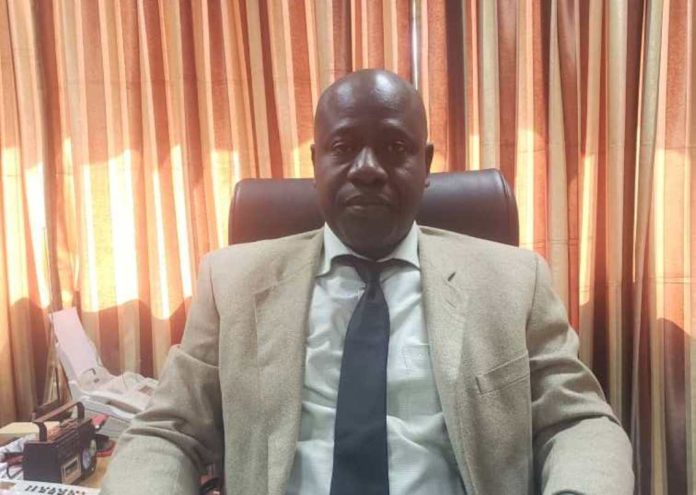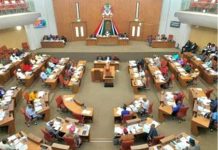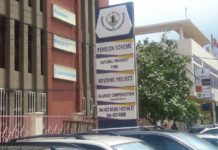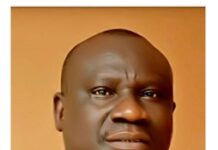By Yankuba Jallow
Foroyaa has engaged the Director General of the Gambia Radio and Television Services (GRTS), Mr Abdou M.K. Touray, on their contract with Excaf Telecom Company of Senegal. The DG has confirmed in an exclusive interview with our reporter, that this private Company would take charge of transmitting the signals of GRTS-TV.
In his introductory statement, GRTS DG said the State TV has the biggest stake when it comes to the digitalization of the media, than any institution.
“The issue of migration affects Television broadcasting, and not the radio, when it comes to IT regulations,” he said.
Digital migration involves the separation of content production and transmission of signals. In short, GRTS will not be using its transmitters to transit its broadcast signals. Rather a separate company will be distributing the signals of GRTS and other tv stations.
He said the idea of the contract is for Excaf to be the signal distributor that will enable various TV stations including GRTS to connect. He detailed that GRTS has been dealing with Excaf since the time of the former regime (APRC government) when he was a manager in those days.
“We signed a contract with Excaf during the former regime but had some issues and it could not hold, because of the funding issues,’’ he said.
He added that the issue of digital migration requires a lot of funding and at some point, Government has to intervene and revoked the contract.
The GRTS DG narrated that in 2018 when he was recalled as Deputy Director General, the contract was on.
“This is an issue that Government needs to take up seriously. The issue of migration is very important,” he said.
He said the year 2017 was the deadline for all ITU countries but the Gambia could not meet the deadline; that this was why GRTS deemed it necessary to enter into the contract with a view to meeting the new deadline, set for the year 2020. He disclosed that there was a National Committee of Migration setup by Government and headed by the DG of PURA, with representatives from GRTS, Broadcasters Association, GAMTEL, Ministries of Finance, Justice and other players. “The Committee was setup to advise Government on the issue of digital migration,” he said.
The Committee has engaged Excaf into discussions after which Government was informed that they can run the program.
“Excaf will partner with Digital Gambia Company that was recently registered. Digital Gambia Company is the subsidiary of GRTS but they are yet to be issued licence to start operations,” he said. He added that once the operational licence is issued, they (Digital Gambia Company) will work with Excaf.
“Digital Gambia is going to conduct the business of migration for the Gambia,” he said.
He indicated that a BoT agreement is yet to be signed because there are issues that both parties still consider.
Foroyaa: How much is the new partner investing into this partnership scheme?
Director General: Excaf is working on a business plan and when their proposal comes, we will look at it and we will know how much they are going to spend on the equipment they will bring into the country. Also, Digital Gambia that we are setting up, will have a business plan. The initial project costs were estimated as 24 million United States dollars. We had an offer from Star Times, a Chinese Company that came with over 60 million United States dollars. We do not go into the offer because the amount is very huge and there is no guarantee that we would be able to pay.
Foroyaa: Was the GRTS board involved and consulted in the formulation of the MoU?
Director General: Yes. The Board was engaged and it is the Board that advised that Digital Gambia Company come up with a business plan to convince the board that Digital Migration will work. It is not an easy process because it involves linking the whole country terrestrially, on a digital platform. Right now, we have some equipment that are digital whereas some are still analogue. The studios are not part of the arrangement because they belong to GRTS. But the transmitters will be operated by Digital Gambia in relation to the project. You can see that transmission and production will be two separate entities now. GRTS will be more focused on content production and broadcasting, whilst Digital Gambia will focus mainly on transmission of signals through various TV stations that will be involved.
Foroyaa: Will the State continue to provide funding for GRTS from the national budget?
Director General: The State is not funding GRTS now. We are not getting any subvention from Government. GRTS is surviving on user fees. This is the 2.5% obtained from credit fees from all GSM operators. It is collected every month and given to GRTS by the Companies. This is what GRTS is using to sustain operations and is not enough.
Foroyaa: What is the duration of the partnership?
Director General: Well the BoT agreement has not been signed yet but Excaf is proposing eight years for the partnership and we are still in discussion. The Chinese are asking for sixteen years renewable, and Excaf is asking for eight years which is also renewable, if they are not able to make their money. This is still under discussion and nothing has been signed yet. The GRTS Act of 2004 mandates us to enter into such partnerships as a State Broadcaster, to engage into the business of Digital Migration. Setting up of a subsidiary is part and parcel of the operation that we are doing, to enhance our operations and make it more meaningful.
Foroyaa: Will there be staff redundancy as per this contract?
Director General: No. No. It is an opportunity for us now because all our staff working in the transmission department, will now work with Digital Gambia Company. It is only technicians and the engineers that will be with GRTS. It is like some of our people are already gone and it will reduce the money we have been spending.




















